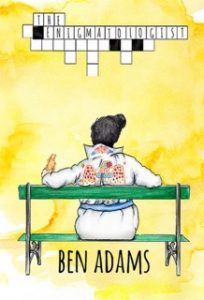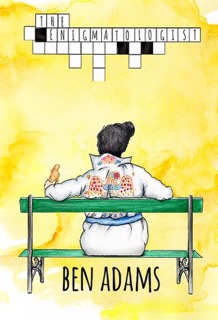 Today, Behind the Words welcomes Benjamin Adams an author with a fun sense of humor and an intriguing background.
Today, Behind the Words welcomes Benjamin Adams an author with a fun sense of humor and an intriguing background.
Welcome Benjamin, tell us a bit about yourself. Where you’re from, where you live? Do you have one of those day-jobs?
I’m originally from Kansas. I grew up in an amazing town about thirty miles north of Wichita called Newton. It was surprisingly diverse for the state, with a large Hispanic population, as well as a sizable Mennonite community. The town was also home to a Mennonite college. The combination of these distinct cultures, as well as being encouraged to be creative, endowed me with a unique world view, one that emphasizes acceptance, social justice, and individuality, granting me the fearlessness to write bizarre stories. Currently, I live in Oakland, California, another great town. Unfortunately, I do have “one of those day-jobs.” I work for a catering company, bartending, managing. I work nights and weekends, giving me plenty of time to write, which is the main reason why I work there. That said, I’d quit in a heartbeat if I could. However, no one every started writing because they thought they’d get rich. So, I’ll probably be catering for another forty years.
How long have you been writing?
I feel like I’ve been writing my entire life. I started writing comics when I was in grade school. I wrote a play about leprechauns when I was six. As I grew older, I moved on to short stories. In high school, I wrote for the school paper, leaving it during my senior year to publish my own humor magazine, although it was mostly pictures of 80’s TV stars with humorous quotes attributed to them, and articles about skateboarding. Despite this output, when I went to college, I decided to study music instead of creative writing, due to the instant gratification gifted from an audience. But around 2008, I got burnt-out on music. After a year of aimlessly stumbling through my living room, I reflected on what my talents were and remembered how fulfilling writing had been when I was younger, and began scribbling short stories. Writing again, I felt like I’d rediscovered some lost part of myself. It was exhilarating. I began taking classes around the Bay Area, eventually being accepted into Stanford’s Novel Writing Program. That’s the long answer, and I feel like I’m leaving a lot out. Short answer: fifteen years, then a long hiatus, then another seven or eight years.
Briefly describe your writing day.
My writing day usually consists of heavy procrastination, followed by self-castigation for not working, then several hours of fighting the urge to check facebook while I finally attempt to get through my page goal.
Tell us about your latest release?
It took six years to get my book, The Enigmatologist, out, and despite living with it for all that time, I still feel weird talking about it, like I’m a fraud, or my story lacks merit because it’s goofy. So, I’m going to let the blurb on the back of the book answer this question (I know it’s cheating, but it really is a good description of the book. Plus, I wrote it so it’s not really cheating. Okay, it’s half-cheating).
Twenty-something, John Abernathy is disillusioned. His job as a private investigator is unfulfilling, and he can’t find work in his chosen field, Enigmatology, the study and design of puzzles. He is about to quit when the National Enquirer calls. A woman in Las Vegas, New Mexico sent them a photo of someone who’s supposed to have died 35 years ago—Elvis Aaron Presley. And they need John to investigate it.
When the Elvis impersonator, Al Leadbelly, is murdered, John investigates, finding Air Force colonel, Alvin Hollister—convinced Leadbelly has information regarding Elvis’s death—at the crime scene conducting his own investigation. John discovers his great-great-great grandfather’s journal—unearthing a conspiracy entwining Elvis, shape-shifting aliens, and Mary Todd Lincoln. Now John must discover if Leadbelly is really Elvis, an obsessed fan, or something more.
Are your characters entirely fictitious or have you borrowed from real world people you know?
All the characters are both fictitious and also parts of my personality. The protagonist, John Abernathy, is probably the closest to me. His character arch mirrors mine in that he struggles with his art. As an enigmatologist, he has studied puzzles collegiately and questions his artistic abilities. I was a professional musician for a while, and after years of struggling to earn a living, seeing people I went to school with succeed, I determined that I wasn’t meant to be a musician. The truth is, I just wasn’t that talented. My gifts lay elsewhere. John also experiences this internal struggle. What I found was, that writing him go though his troubles helped me as well. I was able to accept the truth about myself, that I was not meant to be a musician. And even though this was a hard truth to realize, what I discovered, this un-nurtured writing gift, was infinitely more rewarding.
Where did you get the idea from?
The idea for The Enigmatologist came from a conversation I had about how the headlines and articles of The National Enquirer and other tabloids used to be focused on myths like the Loch Ness monster, Bat Boy, and Elvis sightings. A thought occurred to me, “Who investigates these sightings, confirms them?” The obvious answer is no one. These tabloids are strictly entertainment. But as a writer, and someone with an overactive imagination, this question sparked an idea that I had to get on paper. So, I wrote a short story about a private investigator who was hired by the National Enquirer to investigate an Elvis sighting. I brought it into one of my writing workshops and was encouraged to turn into a novel.
Would you share one detail from your current release with readers that they might not find in the book?
In the beginning of the book, we learn that John’s father has been missing for eighteen years. We also learn that John has taken a job in a private investigator’s office after graduating from college. What we don’t know, what I didn’t include, is that John took the job as a way to track down his father for the purposes of confronting him over abandoning John. I guess this counts as my J.K Rowling moment, revealing some secret backstory after the book has been released.
Who has been the most difficult character for you to write?
John Abernathy, the protagonist of The Enigmatologist. The rest of the characters are comic relief and wrote themselves. John, especially in the book I’m working on now, has a very unique journey, something that I have to plot over the course of the series (this is where I should say that The Enigmatologist is the first book in a trilogy), and it’s been a challenge figuring out what his internal struggles are book to book, and how his internal conflict in the first book leads to the internal conflict in the second, and so on.
If you could be one of your characters for a day which character would it be? Why?
Al Leadbelly, the Elvis Impersonator. He’s one of those characters that does and says whatever he wants regardless of the consequences.
What are you working on now?
Right now, I’m working on the second book, a sequel to The Enigmatologist, as well as a short story. The short story is really exciting me right now. I’m experimenting with stream of consciousness, really trying to explore how our internal thoughts digress tangentially then loop back around to the starting point. Plus, the narrator is a really terrible person, and those are the most fun to write.
We all know how important it is for writers to read. Are there any particular authors that have influenced how you write and, if so, how have they influenced you?
I’ve been influenced by different writers at different times. Right now, I really like Daniel Woodrell. His sentence construction, really deconstruction, is amazing. They just jump out at you as works of art. I’m working on this thing that he does with contrasting images, where you take something like light and dark, or hot and cold, (those are really simple, but illustrate the point) and apply it to a scene. It’s a little descriptive component that creates a certain type of tension, these two elements rubbing against each other. And he’s a master of it.
If you could have dinner with any writer living or dead, who would it be and why?
Ray Bradbury. Aside from being one of my favorite all-time writers, he had an infectious enthusiasm for writing and humanity. Whenever I watch one of his interview clips, I leave feeling fortunate to have the opportunity to write stories that are both bizarre and personal, and grateful that someone wants to read them.
Do you have a secret talent readers would be surprised by?
I can do a spot-on impression of Bruce Willis, although it’s more of a caricature of every character he’s ever played as opposed to an impression in the traditional sense. It’s actually pretty simple. I take all the emotion out of my voice and quietly say, as deadpan as possible, “I’ll do it.”
Your favorite go to drink or food when the world goes crazy!
Bourbon. I like to sit on the deck as the sun sets and sip away the sorrows.
What is the one question you never get asked at interviews, but wish you did? Ask and answer it.
I wish someone would ask me the classic Barbara Walters-esque question “What type of tree would I be, and why?” My answer: A Christmas tree, because it’s the only tree that looks like it poops presents.
HA! Perfect! Thank you so much for joining us today.
Readers, you can purchase The Enigmatologist at:
Ravenswood Publishing
Amazon
Barnes & Noble
Kobo
Google Store
iTunes
You can find out more about Benjamin and his books at:
Website
Facebook






